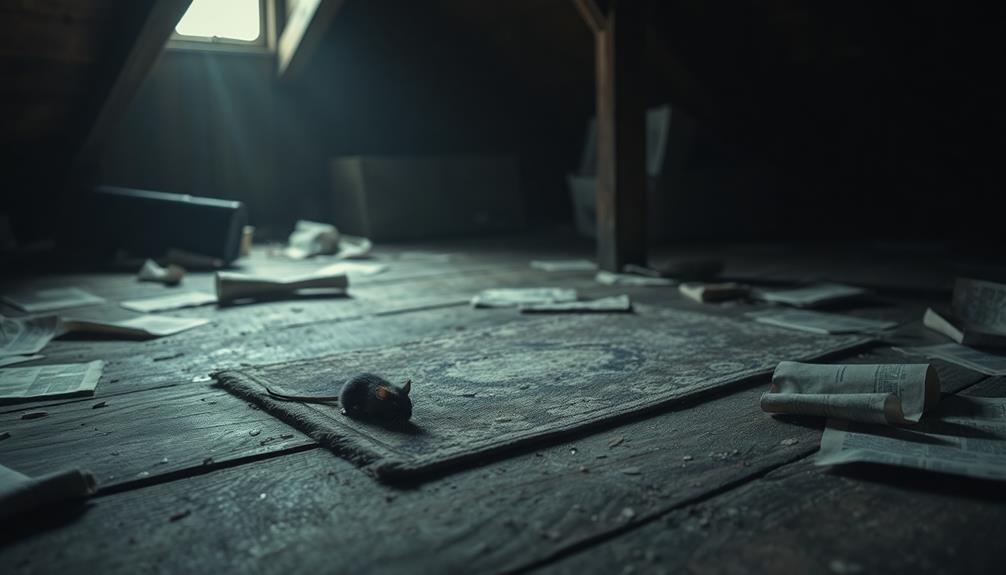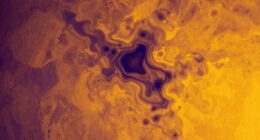The smell of dead mice is really strong and unpleasant—it's often compared to rotten cabbage or spoiled food! You might notice it lingering in warm or humid places for days, or even weeks. This odor comes from the decomposition process, releasing a mix of nasty compounds, sometimes triggering feelings of disgust. It's especially intense in small spaces, like attics or behind walls, and can penetrate pretty much anywhere. If you catch a whiff, it's time to investigate and act fast, as it's also a health hazard. Stick around to learn how to handle this situation effectively!
Key Takeaways
- The smell of a dead mouse is strong and unpleasant, resembling rotten food or sulfur, and can persist for days to weeks.
- It evolves over time, often including musty, fishy, and ammonia-like notes that become more intense as decomposition progresses.
- The odor is particularly strong in enclosed spaces and can penetrate walls and air ducts, complicating source identification.
- Health risks include respiratory issues and potential exposure to airborne pathogens like hantavirus, making protective measures essential during cleanup.
- Detecting the smell often involves checking for droppings, nests, and increased insect activity, particularly in attics and basements.
Introduction
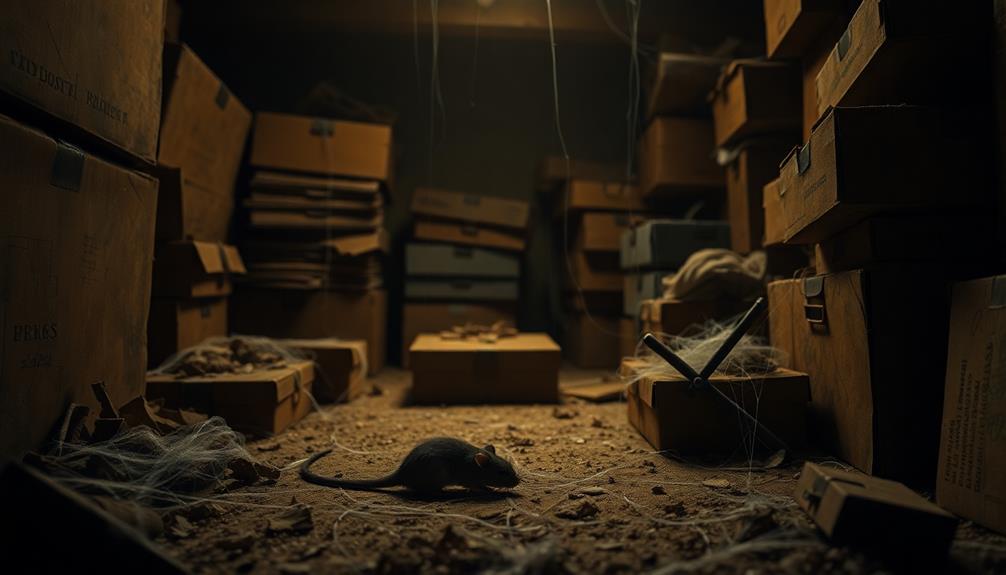
When you encounter the smell of dead mice, it's hard to ignore. This strong and unpleasant odor can fill an entire room, making you wrinkle your nose in disgust.
The odor of a dead mouse is often compared to rotten food or ammonia, a mix that's particularly pungent in enclosed spaces like attics or behind appliances. As mice and rats decompose, they release volatile organic compounds (VOCs), creating a scent that can resemble rotten cabbage or even sulfur.
The decomposition process intensifies this smell, which can linger for days or even weeks, depending on the warmth and humidity of the area. Maintaining good air quality with an effective air purifier can help reduce lingering odors and improve your living environment.
Finding this odor isn't just a nuisance; it can also signal potential health risks. The smell may come with airborne pathogens released during decomposition, which could pose harm to your health.
So, if you notice that dead mouse smell, it's a good idea to act quickly. Identifying the source can help you address not just the odor but also any underlying issues with pests in your home.
Description of the Smell
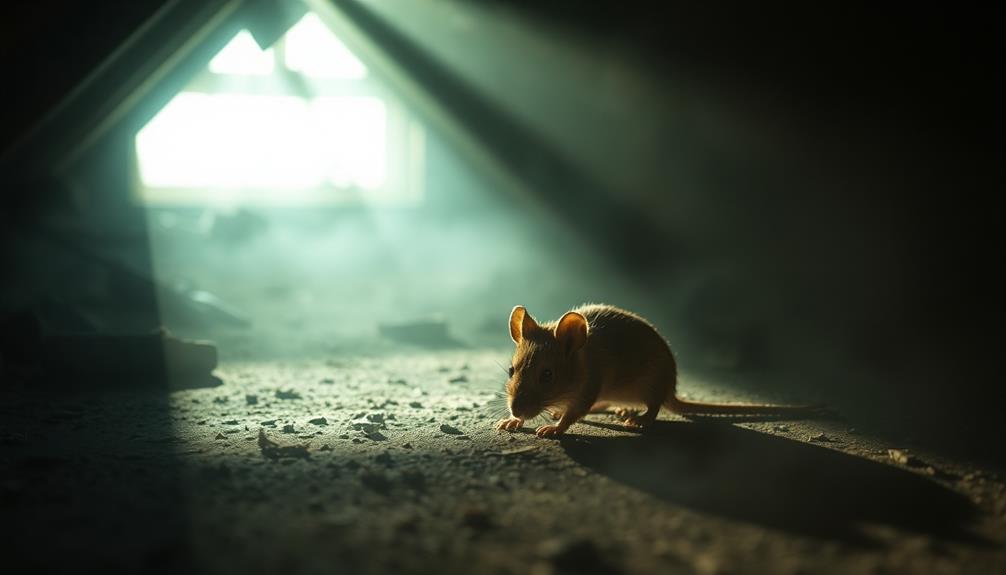
The smell of a dead mouse is unmistakably harsh and lingering, often hitting you like a wall as you enter a room. You might find it hard to breathe, as the dead mouse smells like a combination of musty, rotten food and spoiled cabbage.
It's a pungent odor that can make your stomach churn. In some cases, the scent may be exacerbated by the presence of other unpleasant odors, similar to those related to essential oils for respiratory health, which can help alleviate breathing issues. As time goes on, the scent evolves, adding sweet, fishy, and even ammonia-like notes, becoming increasingly repugnant.
In enclosed spaces, this smell can penetrate walls, air ducts, and floors, making it tough to find the exact source of the dead rodent. The intensity of the smell can last from a few days to several weeks, depending on the size of the mouse and the warmth and humidity around it.
Carcasses release a potent aroma that's hard to ignore. You may also notice other signs, like droppings or increased insect activity, which can help you confirm the presence of a dead animal nearby.
Once you catch a whiff, you'll never forget it. It's a reminder that nature can be both fascinating and a bit gross at times!
Source and Composition
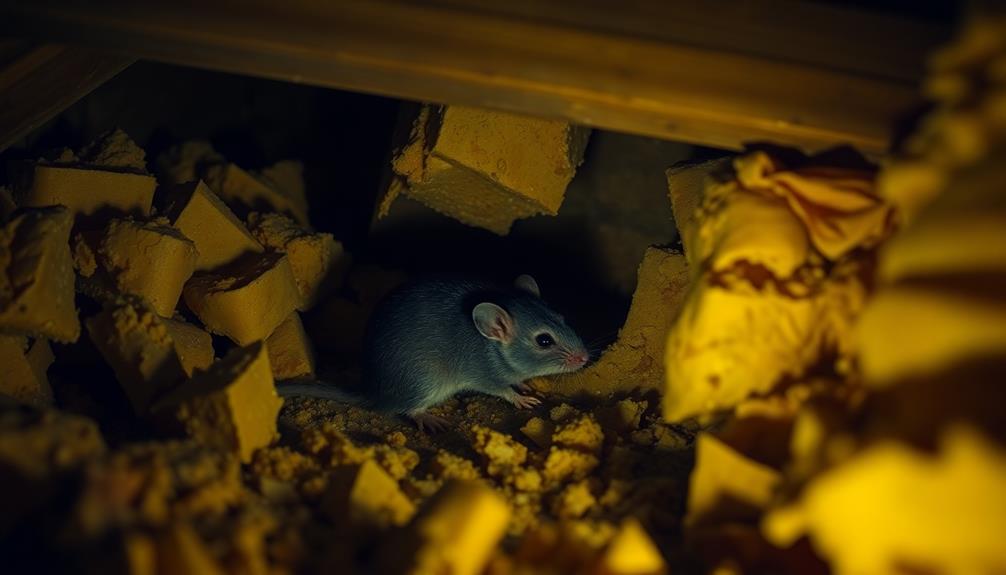
Identifying the source of that nauseating dead mouse smell comes down to understanding its composition. When a mouse dies, its body starts to decompose, releasing volatile organic compounds (VOCs). These VOCs include sulfur dioxides and methane, creating a strong odor that can make you wrinkle your nose in disgust. You might think of a mix between rotten cabbage and spoiled food, which is exactly what's happening as bacteria break down the organic matter.
Interestingly, similar to the environmental impacts of wood-burning, the decomposition process also releases harmful pollutants that can affect air quality. The Impact of Wood-Burning sheds light on how such emissions contribute to health issues.
As decomposition continues, the decay odor becomes even more intense. This smell is especially strong in enclosed spaces with poor ventilation, where it can linger longer. If there's moisture in the air, it can make the persistent smell even worse. The moisture slows down drying processes, allowing the odor to stick around, and it might even draw in other pests looking for a meal.
What's tricky is that this distinctive odor can seep into walls and air ducts, making it hard to pinpoint the exact source. So, if you catch a whiff of that dead mice smell, remember, it's all about those volatile organic compounds doing their work in the shadows!
Typical Scenarios or Environments
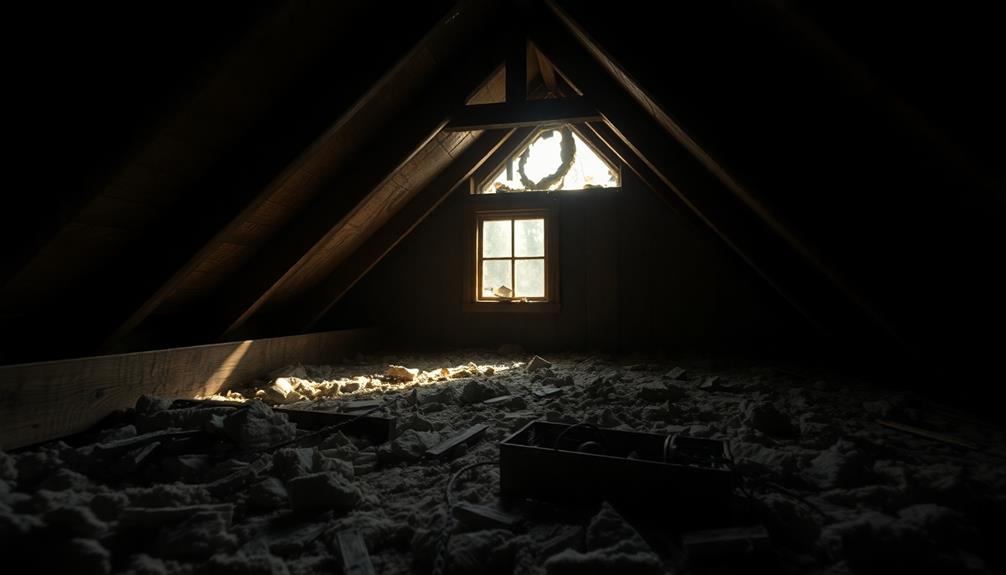
In various scenarios, dead mice often create a strong odor that's hard to ignore, especially in enclosed environments like attics, basements, or behind walls.
When a mouse dies, it produces a pungent smell that can remind you of decaying organic matter. If you're in a warm and humid area, you might notice that smell intensifying within just a few days.
You might find yourself searching under appliances or behind furniture, as these are common hiding spots for dead mice.
The smell can also seep into air ducts, which makes locating the source even trickier. You may not realize it, but that strong odor can attract other pests, like flies and beetles, creating an even bigger problem.
If you ever encounter this situation, getting rid of the dead mouse quickly is crucial.
The longer you wait, the more the smell will linger in your walls and floors.
Emotional or Cultural Associations
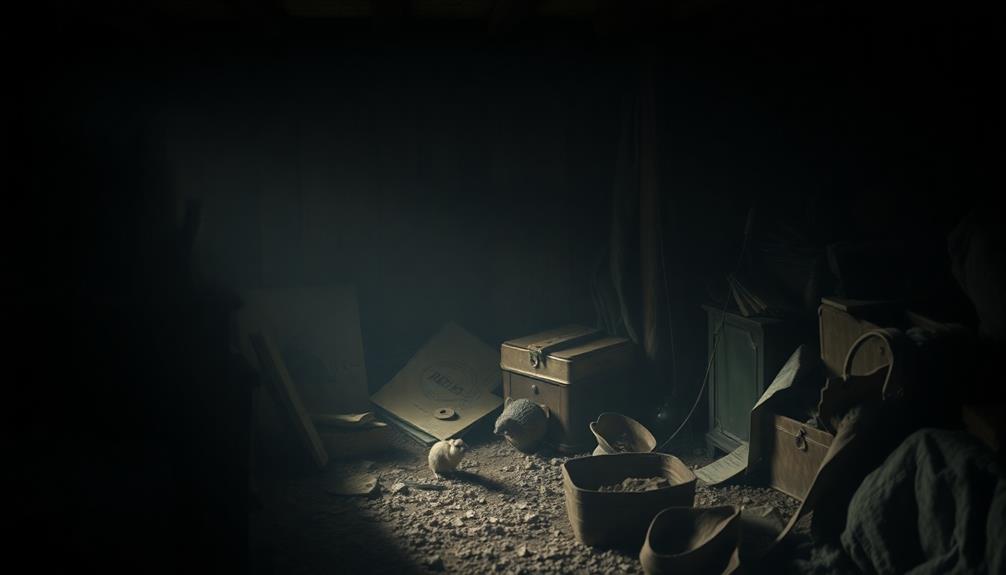
Finding a dead mouse and experiencing its overpowering odor can stir up a range of emotions and cultural beliefs. That smell of decay isn't just unpleasant; it can evoke feelings of disgust and unease. Many cultures see a dead rat as a bad omen, symbolizing misfortune. When you catch that strong scent, it might make you want to cleanse your space, reflecting cultural taboos surrounding death and decomposition.
These emotional responses often connect to a fear of contamination or disease, reminding us of the health risks tied to rodent infestations. In literature, the smell of decay serves as a metaphor for moral decline, reinforcing the negative feelings associated with death.
Moreover, that pungent odor can represent loss and grief. When you encounter the remains of wildlife, it's a stark reminder of the fragility of life and how inevitable death is. It's a moment that can make you reflect on your own experiences and the stories passed down through generations.
Health or Safety Considerations
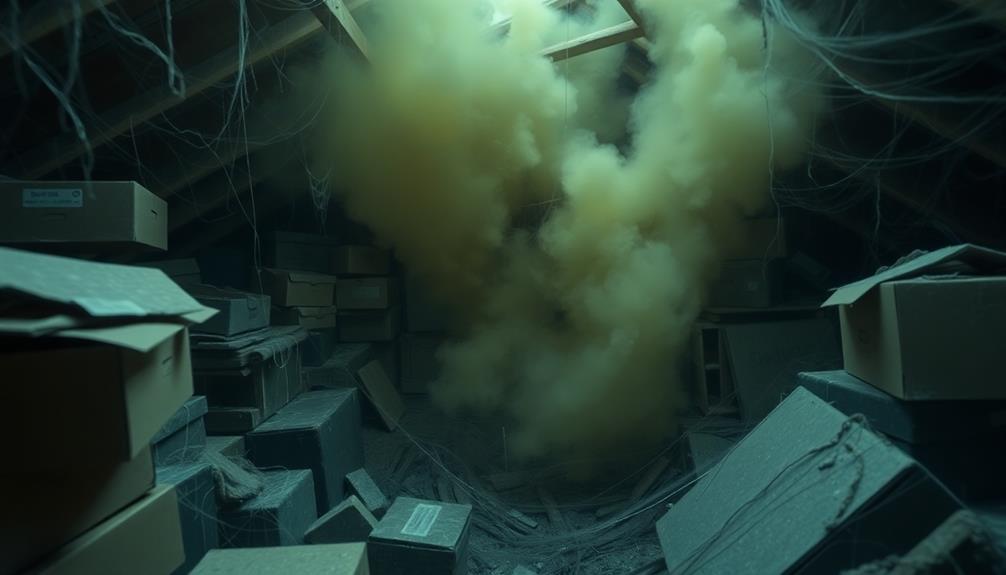
Encountering the odor of dead mice can pose significant health risks that you shouldn't ignore. The smell isn't just unpleasant; it can lead to respiratory issues, headaches, and even nausea.
When dead mice decompose, they release volatile organic compounds (VOCs), which can cause allergic reactions, especially in sensitive individuals. Moreover, decomposing mice can carry pathogens that may become airborne, increasing the risk of diseases like hantavirus and leptospirosis.
To keep yourself safe, it's essential to wear protective gear, such as gloves and masks, during cleanup. This gear helps you avoid direct contact with harmful pathogens and allergens associated with rodent remains.
After removing the carcass, you must focus on thoroughly cleaning the contaminated areas. Using an effective odour remover can help eliminate lingering smells and reduce health risks.
Final Thoughts
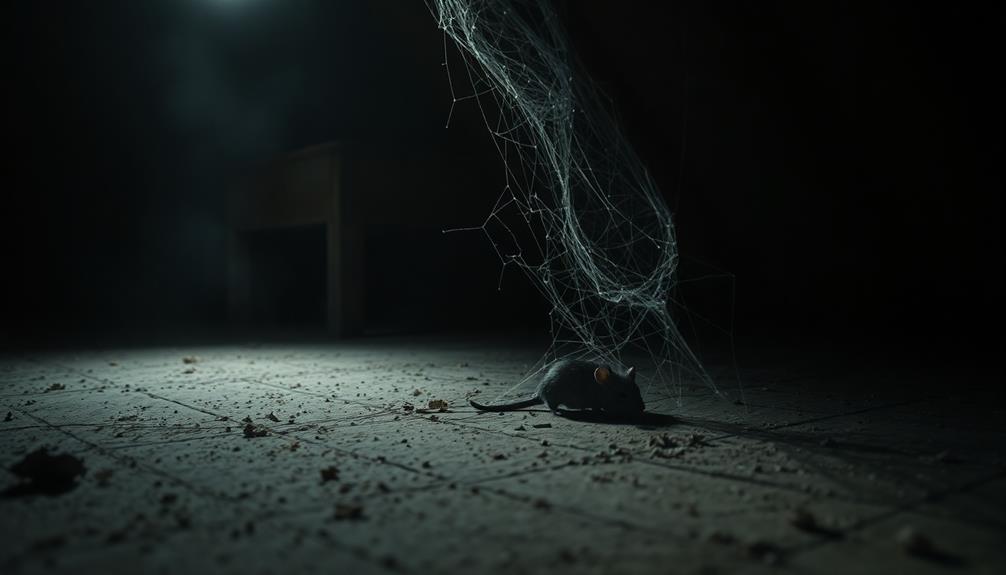
Dealing with the smell of dead mice can be an overwhelming experience, but addressing it promptly is crucial for your health and comfort. The odor from a dead mouse is often described as a strong decay scent, similar to rotten food or musty cabbage.
As the mouse decomposes, this smell can grow stronger over days or even weeks, depending on how warm and humid it's in your home. You might find that the odor seeps into walls, floors, and air ducts, making it tricky to locate the source.
It's important to remember that when a dead mouse decomposes, it releases gases like sulfur dioxides and methane, which contribute to that unpleasant smell. If you ignore it, the odor can linger for weeks!
To tackle this problem, consider using pest control methods to prevent mice from entering your home in the first place. If you do find a dead mouse, act quickly to remove it.
Not only will this help get rid of the odor, but it'll also keep your living space safe and comfortable. So don't hesitate—take action, and your home will smell fresh again in no time!
Frequently Asked Questions
How Long Does It Take for the Smell of a Dead Mouse to Go Away?
The smell of a dead mouse can linger for days to weeks, depending on factors like temperature and ventilation. You should remove the carcass and clean the area to speed up the odor's disappearance.
What Is the Scent of a Dead Mouse?
When you encounter the scent of a dead mouse, you'll notice a strong, musty odor, reminiscent of decaying food. It can deepen over time, becoming more rancid and fishy, especially in poorly ventilated areas.
Is Breathing in Dead Mouse Smell Harmful?
Breathing in dead mouse smell can definitely be harmful. It can trigger respiratory issues, headaches, and nausea. If you're sensitive, consider wearing a mask and gloves during cleanup to protect yourself from potential health risks.
Does Dead Mouse Smell Attract Mice?
Yes, dead mouse smell attracts mice. The scent signals a food source, prompting other rodents to investigate. If you don't remove the carcass promptly, you might inadvertently invite more mice into your space.
